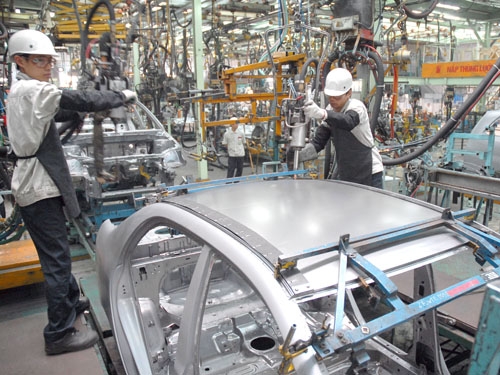
| FIEs are considering leaving Vietnam for neighboring markets | |
VietNamNet Bridge – A lot of foreign invested associations have warned they are considering leaving Vietnam for the more attractive markets, like Cambodia or Myanmar. A recent survey by EuroCham has found that 20 percent of its members are considering heading for other regional markets instead of staying in Vietnam. The organization has pointed out that this is a sign showing the investors’ disappointment about the Vietnamese business environment and the strong rise of the other regional countries. The survey has also found that 45 percent of businesses believe other ASEAN markets could be the better places for them to do business rather than Vietnam. When asked to make assessments about the Vietnamese market’s attractiveness, 37 percent of businesses thought “average,” while only 18 percent said Vietnam was in the leading group. Only 34 percent of EuroCham’s businesses said they plan to expand their business scale in Vietnam, while the figure was 42 percent in the previous survey. Meanwhile, the number of enterprises planning to scale down business has increased slightly from 19 percent to 21 percent. Eurochaim’s Chair Preben Hjorrtlund said the problem is that the business environment has not been improved, while it has been staying at “average.” Even the foreign enterprises which have been doing business in Vietnam for a long time also think some other markets are more attractive than Vietnam. The Japanese Enterprises’ Association in Vietnam believes that the complicated administrative procedures have always been the biggest barriers to foreign invested enterprises. Meanwhile, logistics services remain weak and the labor force cannot be fully exploited because of the regulations on limiting extra working hours. Kimio Yamaguchi, Chair of the association, who is also the General Director of Sojitz Vietnam, confirmed that Japanese plan to make more investments in Vietnam, but said the investment environment here is still below their expectations. The articles of the amended Labor Code about the minimum wages and the extra working hours have also raised worries among EuroCham’s businesses. Nicola Connolly, Deputy Chair of EuroCham said garment and footwear enterprises need their workers to take more extra working hours to fulfill seasonal orders. Meanwhile, the current laws stipulate that Vietnamese workers only have 200 extra working hours per annum, much lower than Thai, Singaporean and Malaysian who can have up to 900 extra working hours. Prior to that, in June 2013, at the Vietnam Business Forum, AusCham’s representative gave the warning that if Vietnam cannot generate a favorable business environment, the foreign direct investment (FDI) would be driven to other regional countries such as Indonesia, Thailand, Cambodia or Myanmar which have emerged as the attractive destinations for foreign investors. Do Nhat Hoang, Head of the Foreign Investment Agency of the Ministry of Planning and Investment MPI, has blamed the worsening of the investment environment on the Decree No 108 that guides the implementation of the investment law. A lot of problems have been found in the legal document which is expected to be amended. Hoang has also attributed the problem to the unreasonable legal framework which stipulates overlapping regulations. It is expected that the investment law would be amended in 2014 which is hoped to “settle a lot of existing problems.” | |
| http://english.vietnamnet.vn/ |
